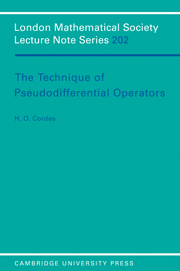Book contents
- Frontmatter
- Contents
- Preface
- Chapter 0 Introductory discussions
- Chapter 1 Calculus of pseudodifferential operators
- Chapter 2 Elliptic operators and parametrices in ℝn
- Chapter 3 L2-Sobolev theory and applications
- Chapter 4 Pseudodifferential operators on manifolds with conical ends
- Chapter 5 Elliptic and paraolic problems
- Chapter 6 Hyperbolic first order systems
- Chapter 7 Hyperbolic differential equations
- Chapter 8 Pseudodifferential operators as smooth operators of L(H)
- Chapter 9 Particle flow and invariant algebra of a semi-strictly hyperbolic system; coordinate invariance of Opψxm.
- Chapter 10 The invariant algebra of the Dirac equation
- References
- Index
Chapter 0 - Introductory discussions
Published online by Cambridge University Press: 09 February 2010
- Frontmatter
- Contents
- Preface
- Chapter 0 Introductory discussions
- Chapter 1 Calculus of pseudodifferential operators
- Chapter 2 Elliptic operators and parametrices in ℝn
- Chapter 3 L2-Sobolev theory and applications
- Chapter 4 Pseudodifferential operators on manifolds with conical ends
- Chapter 5 Elliptic and paraolic problems
- Chapter 6 Hyperbolic first order systems
- Chapter 7 Hyperbolic differential equations
- Chapter 8 Pseudodifferential operators as smooth operators of L(H)
- Chapter 9 Particle flow and invariant algebra of a semi-strictly hyperbolic system; coordinate invariance of Opψxm.
- Chapter 10 The invariant algebra of the Dirac equation
- References
- Index
Summary
In the present introductory chapter we give comprehensive discussions of a variety of nonrelated topics. All of these bear on the concept of pseudo-differential operator, at least in the author's mind. Some are only there to make studying ψdo's appear a natural thing, reflecting the author's inhibitions to think along these lines.
In sec.1 we discuss the elementary facts of the Fourier transform, in sec. 's 2 and 3 we develop Fourier-Laplace transforms of temperate and nontemperate distributions. In sec.4 we discuss the Fourier-Laplace method of solving initial-value problems and free space problems of constant coefficient partial differential equations. Sec.5 discusses another problem in PDE, showing how the solving of an abstract operator equation together with results on hypo-ellipticity and “boundary-hypo-ellipticity” can lead to existence proofs for classical solutions of initialboundary problems. Sec.6 is concerned with the operator eLt, for a first order differential expression L. See's 7 and 8 deal with the concept of characteristics of a linear differential expression and learning how to solve a first order PDE. Sec.9 gives a miniintroduction to Lie groups, focusing on the mutual relationship between Lie groups and Lie algebras. (Note the relation to ψdo's discussed in ch.8).
We should expect the reader to glance over ch.0 and use it to have certain prerequisites handy, or to get oriented in the serious reading of later chapters.
Some special notations.
The following notations, abbreviations, and conventions will be used throughout this book.
- Type
- Chapter
- Information
- The Technique of Pseudodifferential Operators , pp. 1 - 51Publisher: Cambridge University PressPrint publication year: 1995

